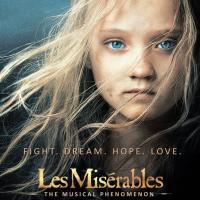
A film about revolution and the appalling injustices of society – but the message is about individual salvation through love.
Les Miserables is a first class film. The momentum never stops and there are some fantastic performances by Hugh Jackman as Jean Valjean, Anne Hathaway as Fantine and Russell Crowe as Javert.
The comic talents of Helena Bonham Carter and Sasha Baron Cohen provide a counterpoint to the serious side of the story.
"Les miserables" (powerful words inadequately translated as "the poor") are the focus of the original story – not a narrative that Hollywood was likely to be enamoured of.
Tom Hooper concentrates on the romance at the expense of the social message, but not completely.
The story, based on a two-volume 19th century novel by Victor Hugo, is not miserable at all because it contains within it a message of hope that things can be changed.
Revolution
It is worth comparing the revolutionaries in Les Miserables with those other revolutionaries in a 19th century novel – the blood-stained monsters depicted in Dickens’ A Tale of Two Cities.
Although the revolution of 1830 was defeated, Victor Hugo sees the revolutionaries as human beings and evokes sympathy for the cause for which they are fighting.
To say it is a revolutionary film would be pushing it. It is a film about revolution and about the appalling injustices of society but the message is about individual salvation through love.
The central character, Jean Valjean, is imprisoned for five years for stealing a loaf of bread, then another 14 for trying to escape – not an exaggeration of the penal code of the period.
On release he is condemned to carry a yellow passport – an ID card which is as effective as a brand.
A priest seeks to redeem him with an act of kindness and (without retelling the whole story) the narrative rests on the consequences of that act of kindness.
Perhaps the most shocking aspect of the original story is the casting of a policeman, a perfectly respectable upholder of the law with no sympathy for the poor, as a villain.
We are accustomed to seeing ’crooked cops’ but Javert isn’t crooked. He simply enforces an unjust law because it is not his place to change it.
The most powerful scenes involve the street fighting in Paris during the 1830 revolution and the idealism of students and young people who are depicted as simply and selflessly fighting for the poor of their own city.
I am aware that people talk cynically about ’not a dry eye in the house’ but it really is an accurate description of how people in the audience respond to this.
In the final scene the selflessness is rewarded when, with Les Miserables, they ascend to heaven. Dickens, for all his compassion, would have had them going to the other place!
The same songs are repeated with a different emphasis at different times in the film but the message of what happens when society offers no future to the poorest members of the community could not be clearer. We really will all be in it together!


Be the first to comment